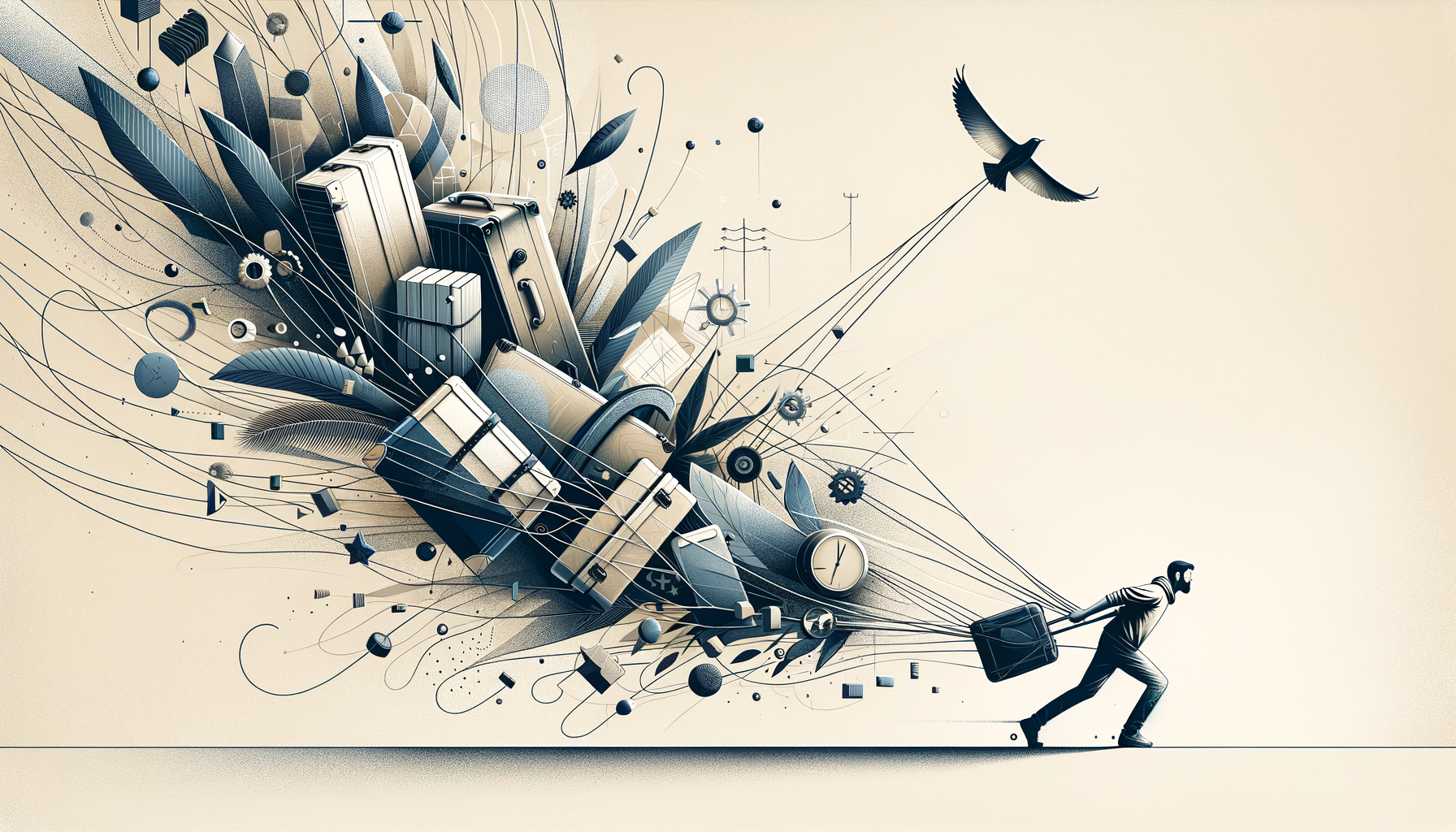I used to judge people who cried during rom-coms. Not in a mean way—more in an “aw, bless their heart” way, like an aunt patting your head after you've botched a cake recipe. I believed, very firmly, that real life's messes couldn’t be resolved in 90 minutes with a perfectly-timed grand gesture and Nora Ephron dialogue. But maybe my skepticism was rooted in the fact that, for years, I carried a secret struggle that felt like it didn’t fit any tidy romantic blueprint. Mine wasn’t about unrequited love or bad blind dates. It was about trust—or, more specifically, my inability to give it.
Let me explain.
The Invisible Backpack
For as long as I can remember, I’ve carried what I call the “invisible backpack.” It contained every betrayal, every disappointment, every time someone I loved let me down. And while most people try to unpack their emotional baggage, I added to mine like I was stocking up for the apocalypse. Friends who drifted away after high school? Toss that in. A college boyfriend who ghosted after two blissful summers working on a food truck together? That’s a whole brick in its own padded pocket. My parents’ arguments when tourism seasons stretched them thin during my teenage years? Every word I overheard became its own pebble in the bag. You're getting the picture.
I thought I was handling things fine because I wasn’t outwardly cynical. I still dated, flirted, and laughed at my roommates’ messy text exchanges with their crushes. But when things in my own relationships started to get serious—and I mean any type of relationship, not just romantic—I never fully let anyone in.
I didn’t call it trust issues, though. That felt dramatic, like something Carrie Bradshaw would melodramatically narrate over footage of her buying yet another pair of shoes. I thought I was just "careful," like a lifeguard watching the riptide warnings before letting people drift too far into my corner of the ocean. But being careful quickly turns into loneliness when you’re too afraid to take off the “invisible backpack.”
The Wake-Up Call
My wake-up call wasn’t a sweeping, cinematic moment. Nobody delivered a teary-eyed monologue begging me to trust them. Honestly, I might’ve preferred the rom-com version because my real-life epiphany was an ugly cry alone on the bathroom floor (can’t you already hear Alanis Morissette playing?).
I had started seeing someone new—not “I’ve planned the wedding playlist in my head” new, but new enough that I liked them a lot. He’d asked me to come to a family cookout, a major milestone in coastal South Carolina where family means shrimp boils and enough cold beer to take out a small horse. My instinct should’ve been excitement; instead, my stomach tied itself into knots so tight it could hold a docked boat.
The self-talk was brutal. “What if I say the wrong thing?” “What if they don’t like me?” And then, quietly: “What if he changes his mind about me once I’m really in his world?”
Overthinking spiraled into canceling plans. Canceling plans spiraled into avoidance. He called me out on it, not in an angry way, but in a kind, confused, “do-you-even-like-me?” way that broke my heart—especially because the answer was yes. Yes, I liked him. No, I didn’t know how to let go of my safety nets.
That night on my bathroom floor, I realized something terrifying: All this time, I had blamed others for my struggles with connection, but I hadn’t once asked myself how I might be sabotaging my own happiness.
How I Started Letting Go
Spoiler alert: unlearning a lifelong coping mechanism isn’t something you fix overnight. Trust isn’t a light switch; it’s a dimmer, and mine started at candle-flicker. But dim light is still light, and eventually, I found ways to trade my heavy emotional backpack for something lighter. Here’s what helped me stop carrying it everywhere like an over-prepared freshman on her first day of school:
-
Honesty Check: Am I Really at Risk?
I started asking myself this simple question when fear tempted me to shut people out: “Am I protecting myself from real harm, or am I inventing harm because I’m scared?” Nine times out of ten, it was the latter. It’s like seeing a jellyfish at the beach and immediately assuming every wave hides a great white shark. Taking a moment to ground myself in reality before reacting made it easier to separate genuine red flags from imaginary ones. -
Let People Mess Up (Within Reason).
I used to think trust was an all-or-nothing deal, like betting your monogrammed towel collection on a roulette wheel. But trust can be built in smaller increments. Instead of testing people with impossible standards, I tried letting them prove themselves worthy of tiny things first. Did they keep their word about a lunch date? Did they apologize for being short-tempered on an off day? Funny enough, when I stopped assuming everyone would let me down, fewer people actually did. -
Let the Right Ones In.
Look, not everyone deserves a beachfront view of your most vulnerable self. But the ones who do? It’s worth trying to give them a chance. I stopped wasting my emotional energy on toxic patterns and started reserving space for people who showed up consistently with kindness and empathy. It’s like curating a bookshelf: some things just don’t belong, and that’s okay. -
Learn to Rest That Backpack.
Every survivalist instinct in me wanted to believe that ditching my invisible backpack entirely would make me unsafe. But my breakthrough moment came when I thought, “What if, instead of carrying this everywhere, I just… set it down for a while?” Imagine lugging a cooler to a picnic only to realize someone else brought the snacks. So much of what I thought I needed to protect myself was just unnecessary overpreparation.
What Comes After
Spoiler alert #2: That guy I stood up for a cookout didn’t stick around, but not in a bad way. We ended things amicably, and his tiny role in my larger story is something I’ll always appreciate. Dating him was like getting my feet wet after years of standing on the shore—necessary, freeing, and a little scary.
And that’s the thing: learning to trust is messy and incremental. Even now, years later, I sometimes feel old instincts tugging at me when friendships or relationships get tricky. But the difference is this: I’m willing to try.
So if you’re reading this wondering how to take your own emotional backpack off, let me tell you this—you don’t have to do it perfectly or all at once. There’s no gold medal for making yourself an open book. Start with one tiny chance. Call the friend you’ve been avoiding. Say “yes” to the date instead of looking for a reason to say “no.” Put down your guard for even an hour and see what happens.
What I’ve learned is this: Everything we crave—love, connection, belonging—exists beyond the walls we build around ourselves. And the only way out is to stop carrying everything that’s keeping us locked inside.
So here’s the takeaway: You don’t have to be fearless to be happy. You just have to be brave enough to let someone knock on the door, even if you’re not completely ready to answer it. Trust me, it’s worth it.




















